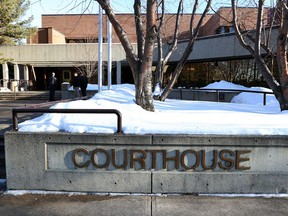‘Contents of the binder provide a remarkable portrait of Ms. Phypers, marred only by what appears to be a one-off but significant occurrence’

Article content
A cynic might think the conditional discharge handed Indigenous Red Deer criminal lawyer Laura Phypers this week suggested she was given special treatment.
Advertisement 2
Story continues below
Article content
And they’d be right.
But Phypers wasn’t handed a sentence Tuesday which will spare her a criminal record for her drunken assault on an Innisfail Mountie because she is a lawyer, nor was she shown leniency simply because she’s a member of a First Nation.
Instead, Phypers was shown mercy by the court because of the unique circumstances which led to her facing a criminal allegation and her exemplary conduct afterwards which justified the rare decision to grant her a discharge.
Lawyers aren’t above the law, and Phypers, 38, wasn’t treated as such.
But Justice John Maher agreed with both Crown and defence lawyers that Phypers’ case contained exceptional factors which warranted a discharge instead of a sentence which would have left her with a criminal record.
Article content
Advertisement 3
Story continues below
Article content
Maher noted defence counsel Christian Manucci supplied a binder of 25 documents, most of which were reference letters from fellow legal colleagues of Phypers, or individuals who could describe her unique and troubled upbringing.
The writers included those “who have known her since her childhood, many from members of the legal profession in the Red Deer area who are familiar with her work as a lawyer and, of particular interest, from three of her siblings.
“The three from her siblings provide a detailed history of her familial history and background, her upbringing, her struggles and her achievements and character, despite of those struggles,” the Sherwood Park Court of Justice judge said.
“Contents of the binder provide a remarkable portrait of Ms. Phypers, marred only by what appears to be a one-off but significant occurrence … which has led her to being here today.”
Advertisement 4
Story continues below
Article content
That “occurrence” was a June 3, 2023, incident in which Phypers was a passenger in a vehicle pulled over by a member of the Innisfail RCMP detachment.
According to a statement of agreed facts presented by prosecutor Robert Morrison, the Mountie was attempting to remove the driver when Phypers exited the vehicle and moved “toward the officer with her fists clenched in a fighting stance.”
Phypers threw punches at the officer and he took both women to the ground, prompting the Mountie to use “multiple strikes in an effort to get Ms. Phypers to stop the assault and place handcuffs on her,” Morrison said.
Recommended from Editorial
Advertisement 5
Story continues below
Article content
Manucci said his client is a respected member of the criminal defence bar in central Alberta who’s excelled despite a tough upbringing and has become a strong advocate for Indigenous communities throughout Alberta.
“Unfortunately, putting on a business suit and practising criminal law does not make you immune from the trauma that one experiences in their past,” Manucci said of the intergenerational trauma suffered by Phypers, like so many other members of Canada’s Indigenous community.
Manucci told court of her upbringing in the Ktunaxa Nation in B.C.’s Kootenay region as one of “utter poverty” and rampant alcoholism and said she has had struggles with alcohol, but since her offence “has perfected sobriety.”
Advertisement 6
Story continues below
Article content
Maher noted both he and the prosecution were impressed with Phypers’ efforts to address her addiction issues following her arrest.
“Based on the aggravating and mitigating circumstances of Ms. Phypers’ personal life and the aggravating and mitigating circumstances of the offence she admitted, in my view … a conditional discharge is clearly the most appropriate sentence in this case,” the judge said.
Discharges are not handed out frequently and do, in fact, amount to special treatment for offenders.
But that doesn’t mean they shouldn’t be utilized in cases where they are warranted, such as Phypers’.
Criminal records are important to ensure offenders are accountable for their actions, but sometimes the facts are such that individuals before the courts with the right backgrounds should be treated differently.
Article content


Comments